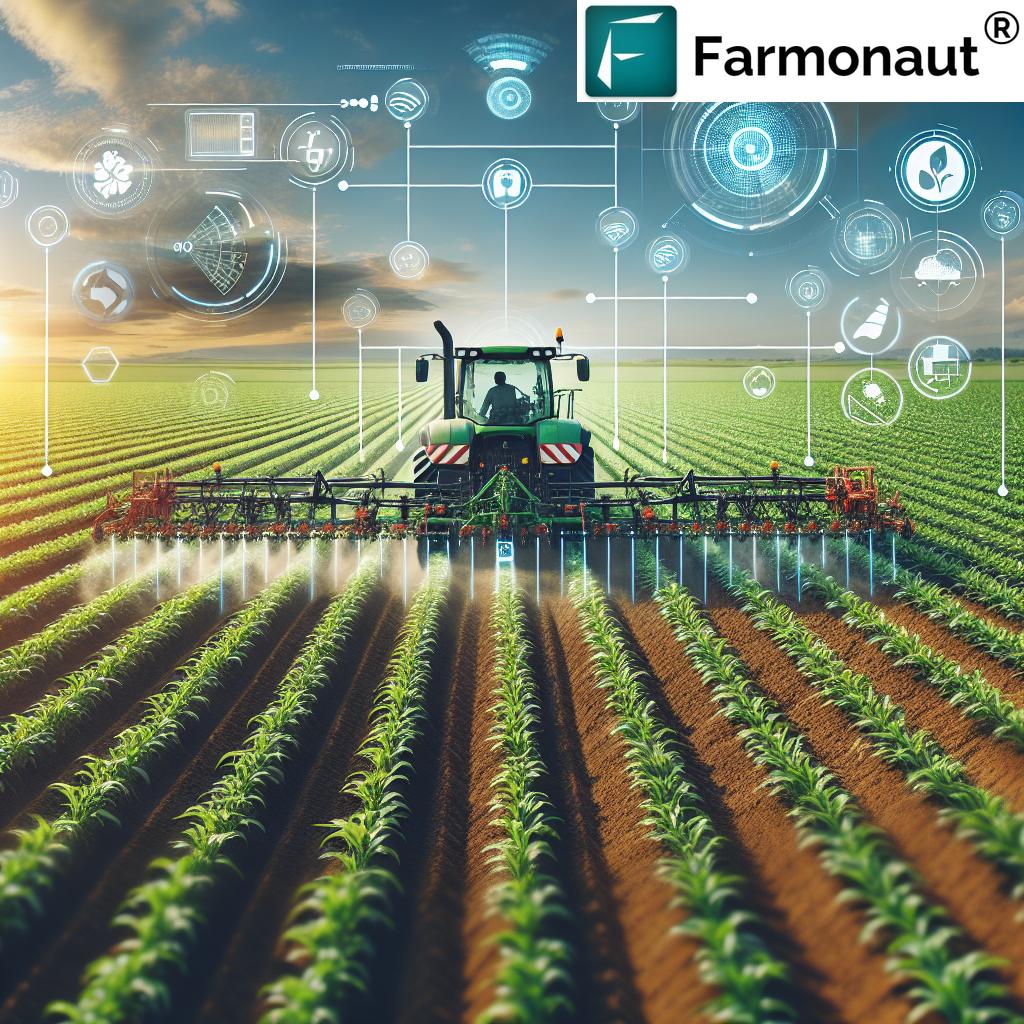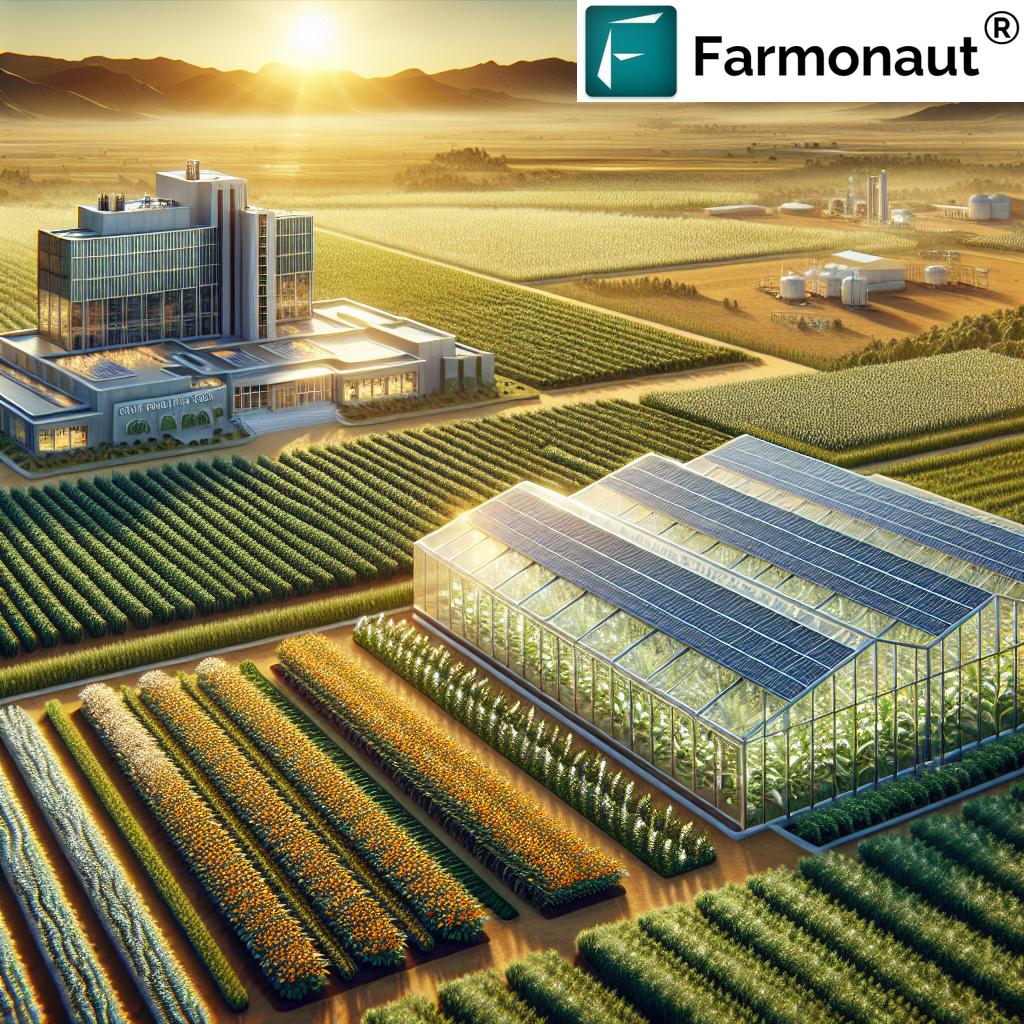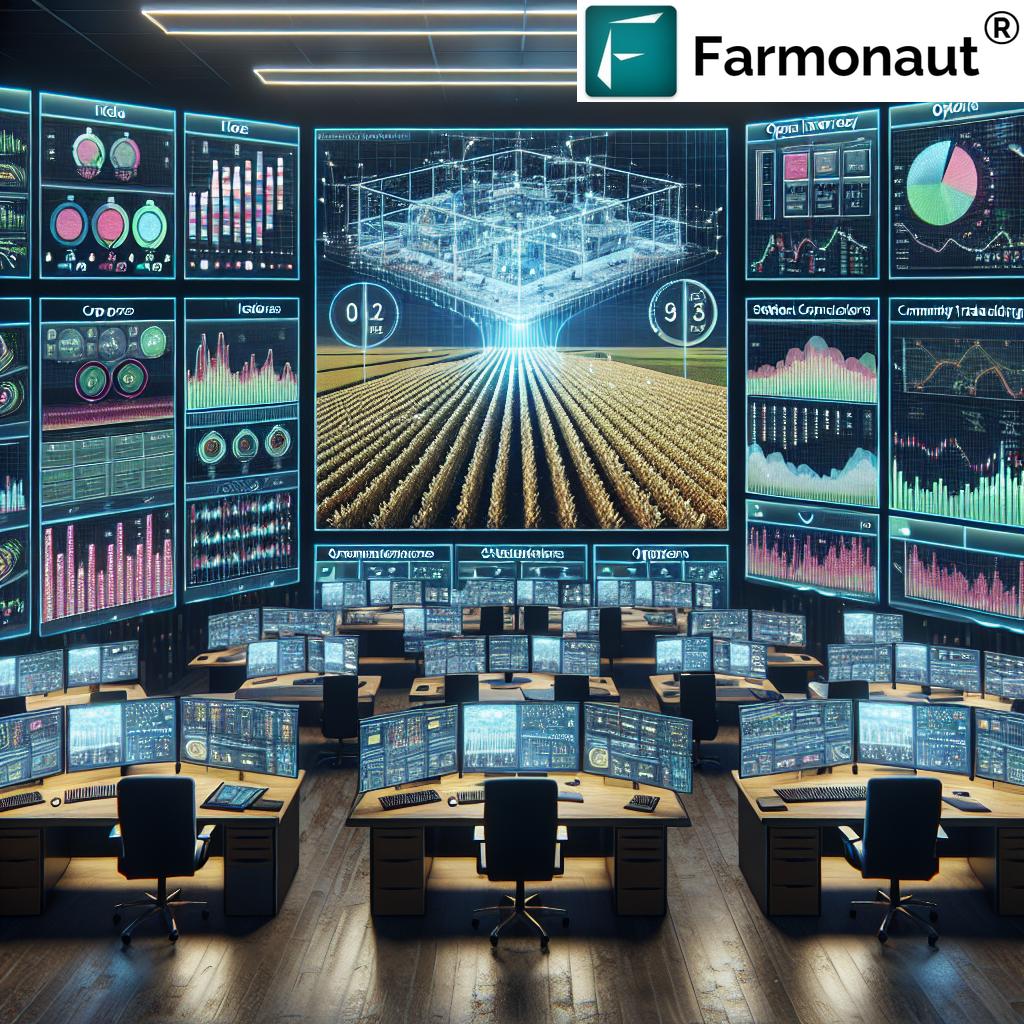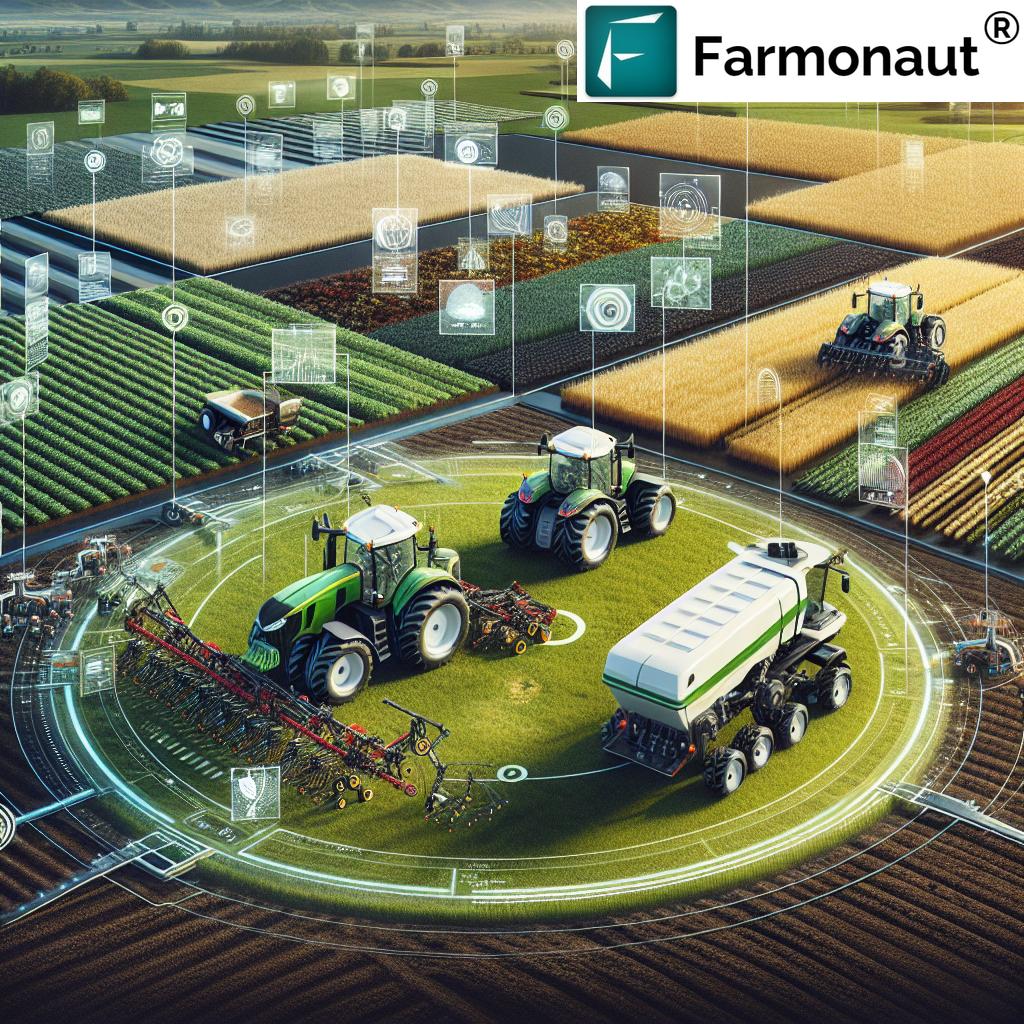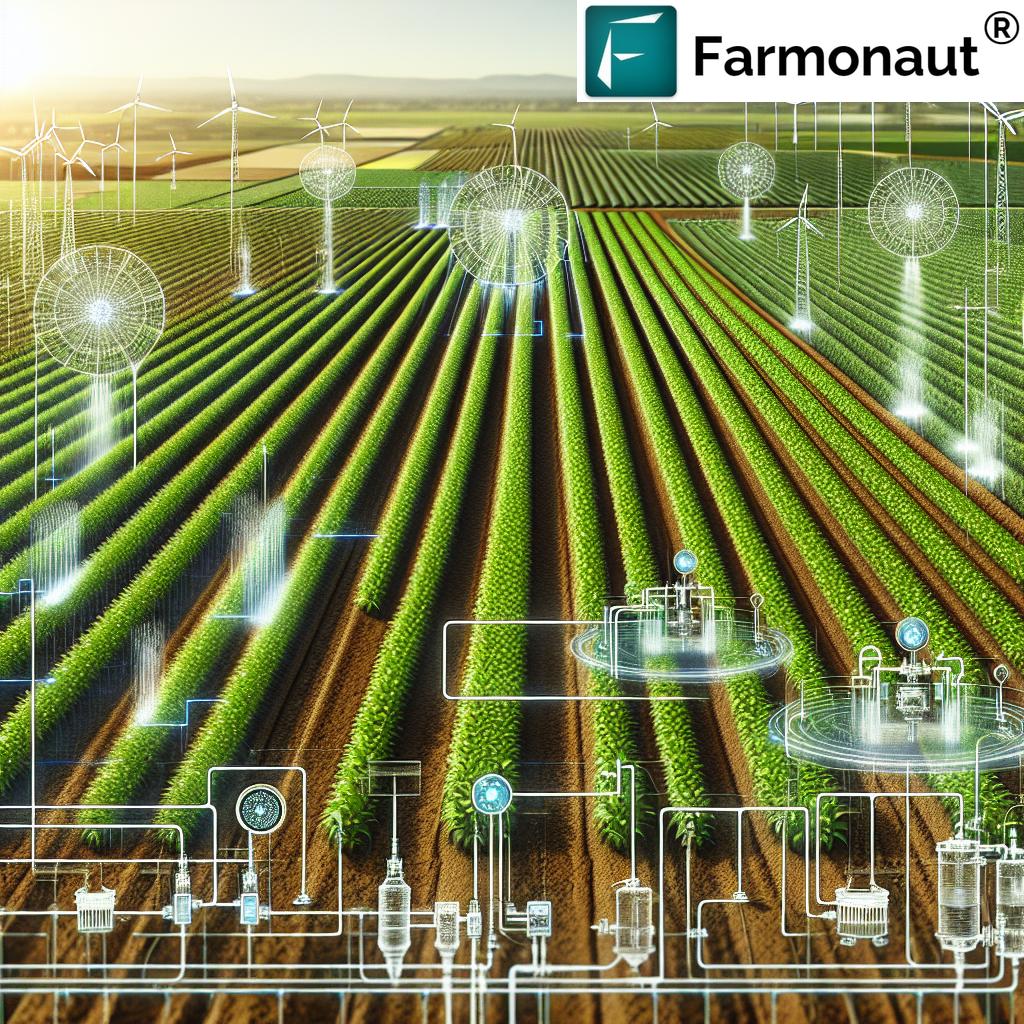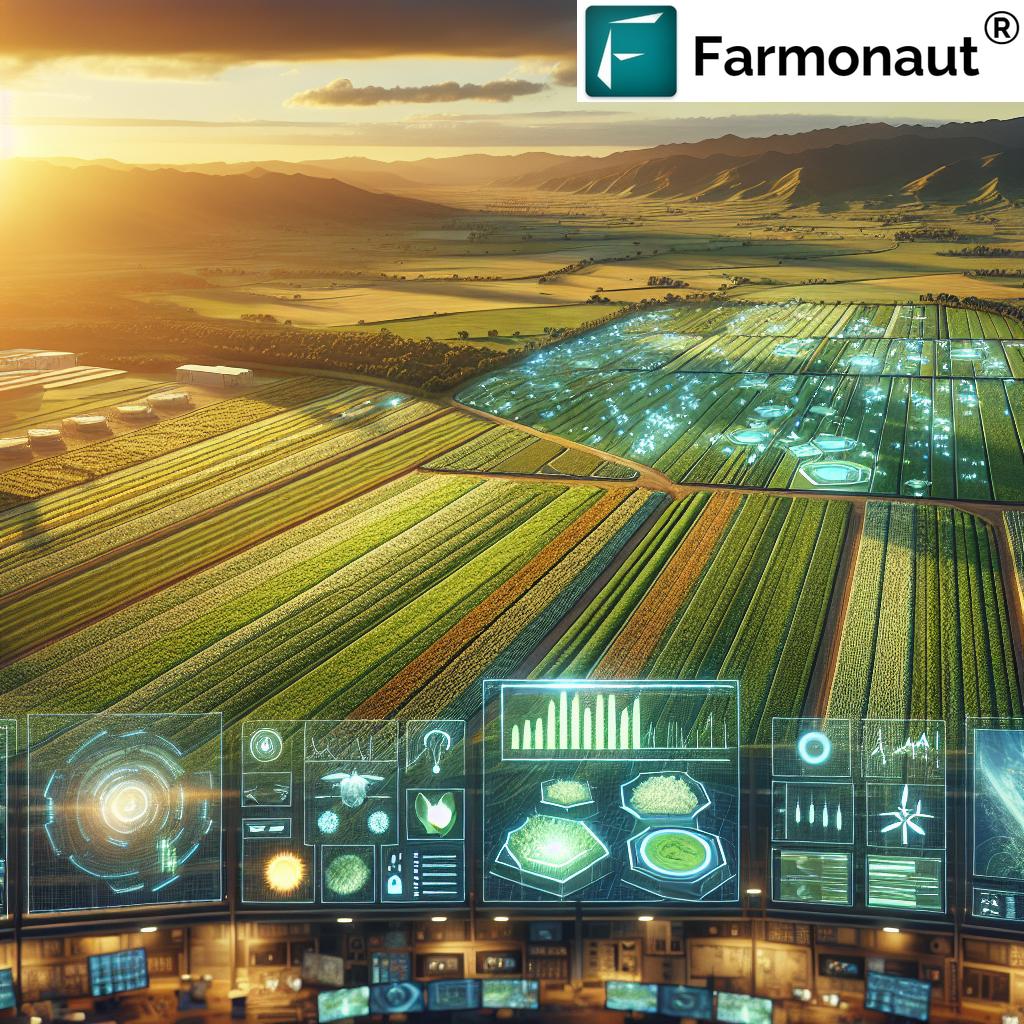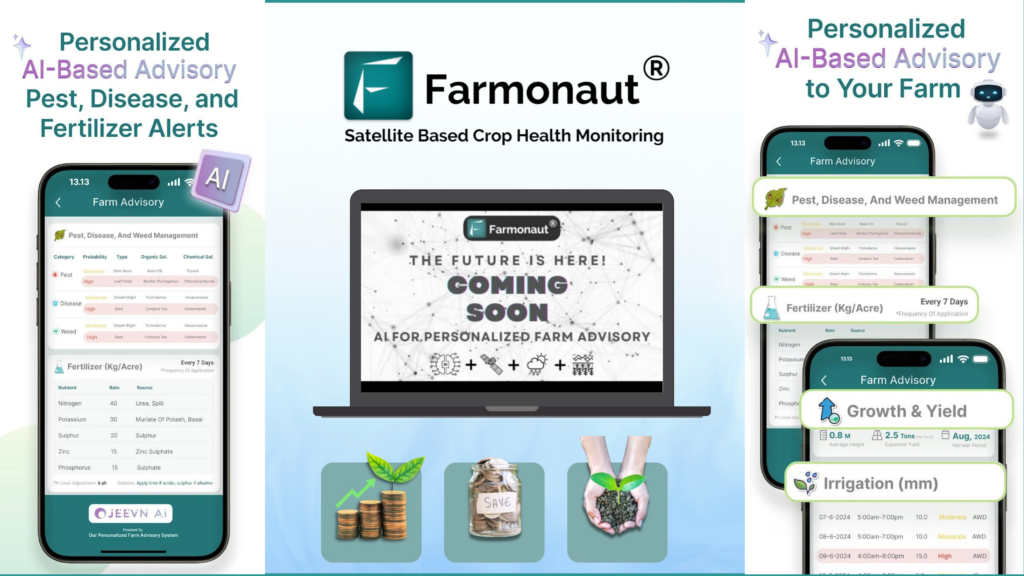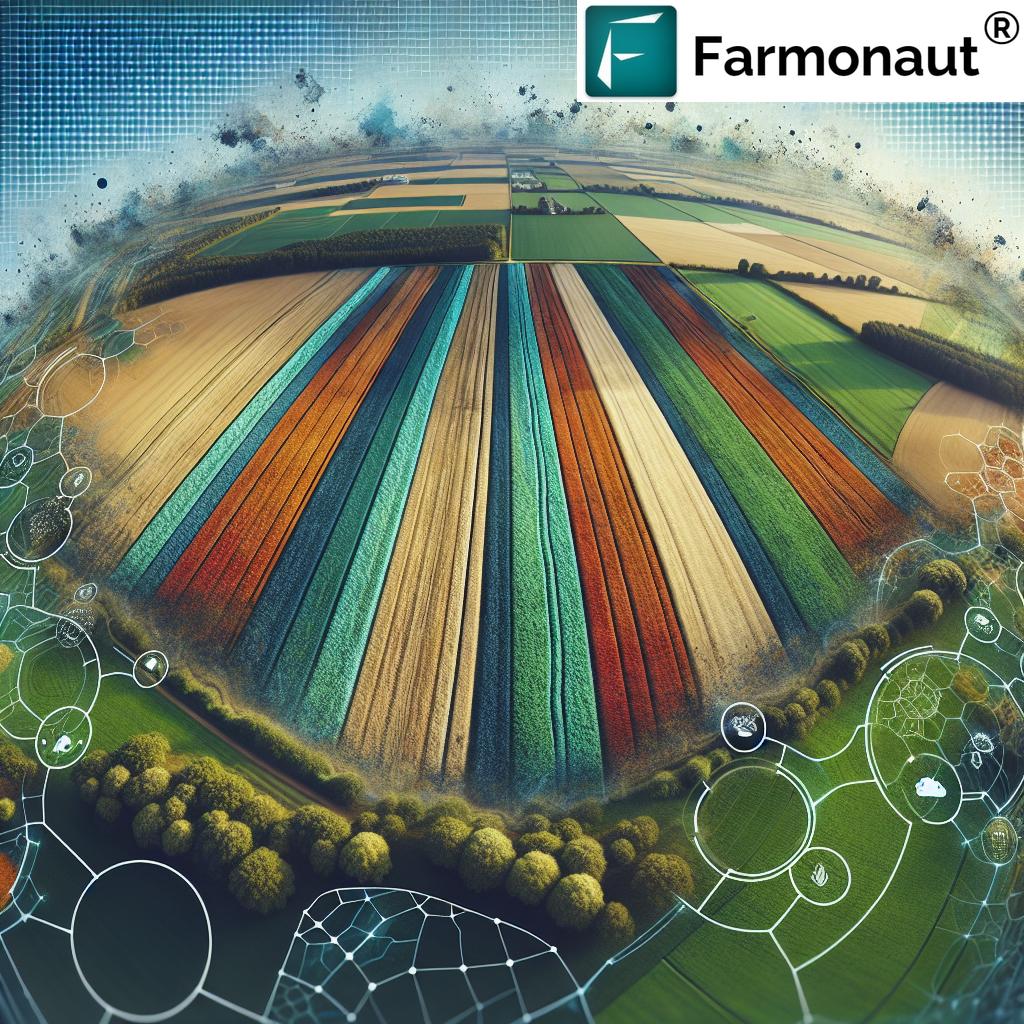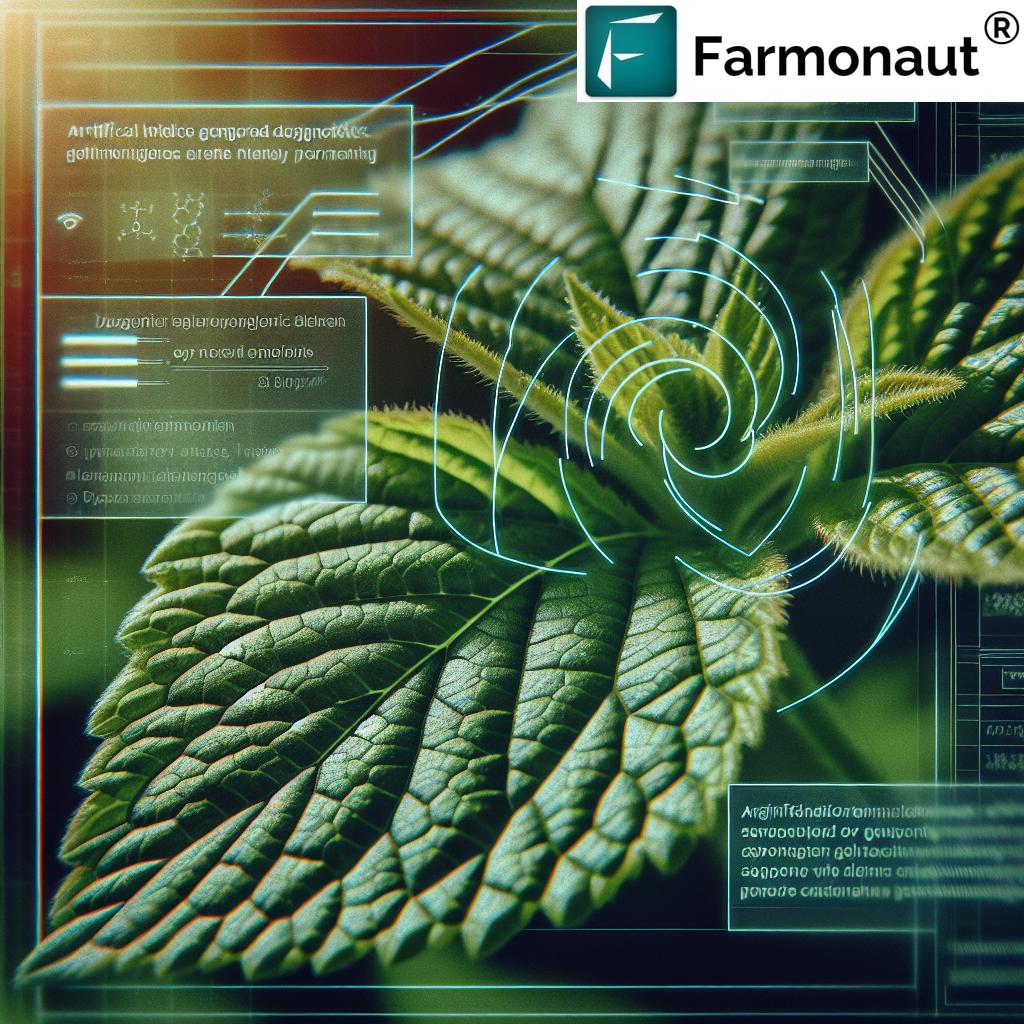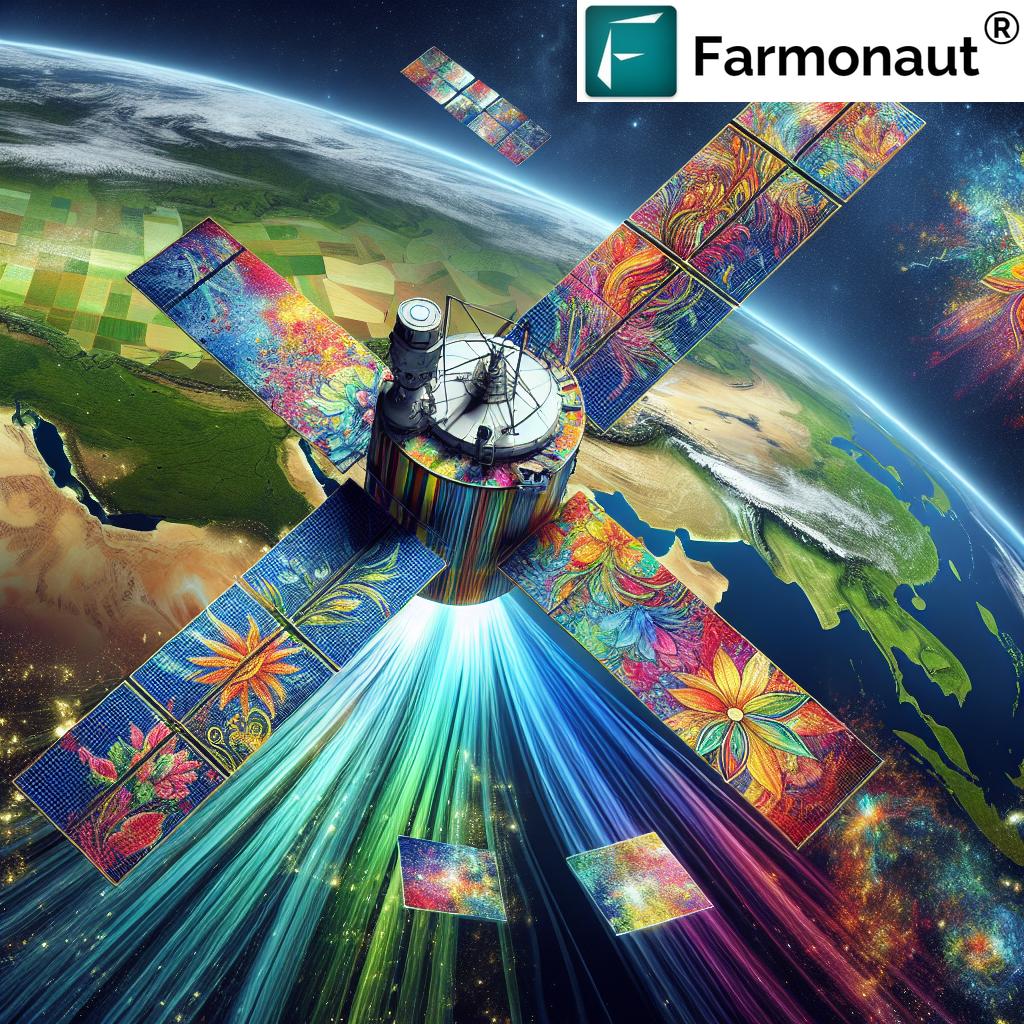Revolutionizing Agriculture: How IoT and Drones Are Driving Precision Farming for Sustainable Crop Yields
“Global food demand is rising, making smart farming solutions essential for sustainable agriculture practices.”
In today’s rapidly evolving world, the agricultural sector is undergoing a profound transformation. As we face the challenge of feeding a growing global population, the integration of Internet of Things (IoT) devices and drones in farming practices is paving the way for a more sustainable and efficient future. We’re witnessing a revolution in agriculture, where precision farming techniques and smart farming solutions are becoming indispensable tools for farmers worldwide.
At Farmonaut, we’re at the forefront of this agricultural revolution, leveraging cutting-edge technology to empower farmers and revolutionize crop management. Our innovative platform harnesses the power of satellite imagery, artificial intelligence, and data analytics to provide comprehensive insights on crop health, detection, and yield prediction.
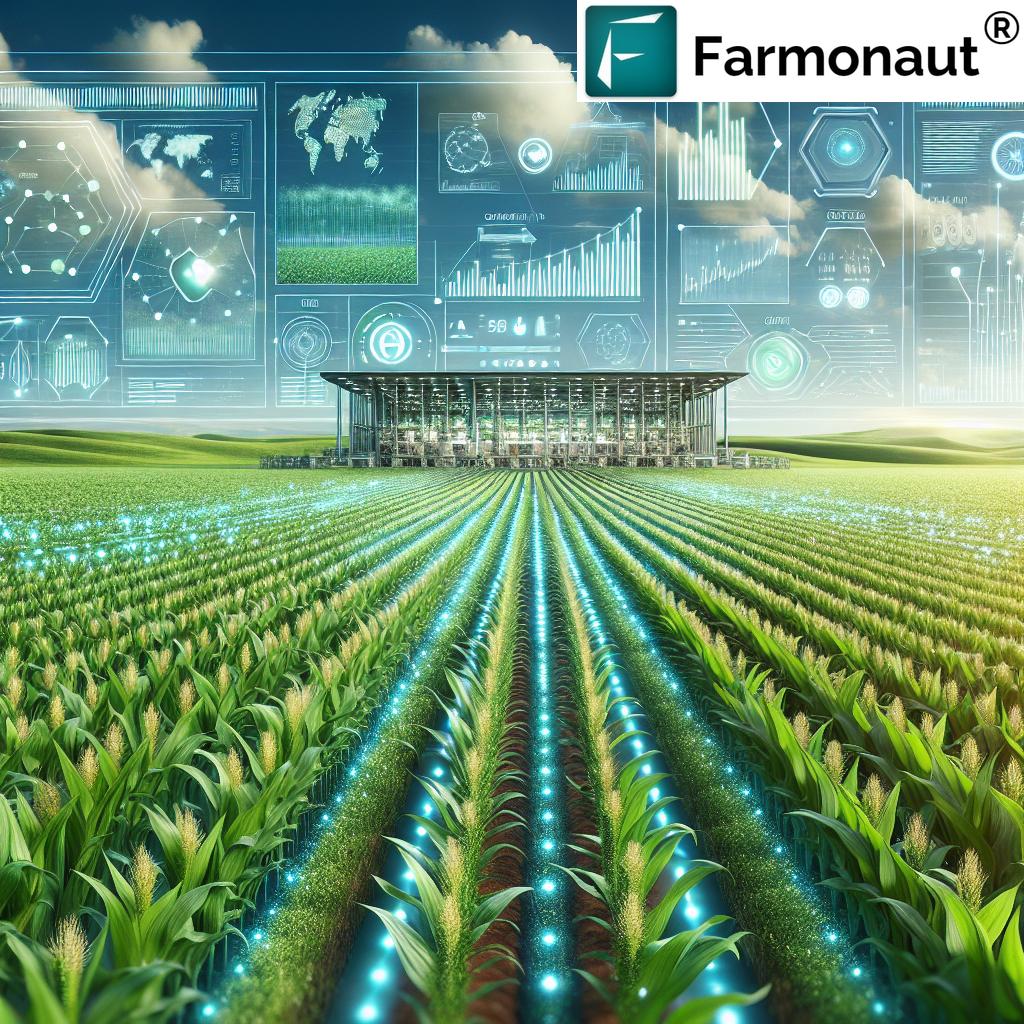
The Rise of Precision Agriculture
Precision agriculture, also known as precision farming, is a management strategy that utilizes advanced technologies to optimize crop yields and reduce resource waste. By incorporating IoT devices, drones, and data analytics, farmers can make informed decisions about every aspect of their operations, from planting to harvesting.
Some key components of precision agriculture include:
- IoT sensors for real-time monitoring of soil conditions, weather, and crop health
- Agricultural drones for aerial mapping and crop inspection
- GPS-guided machinery for precise planting and harvesting
- Data analytics platforms for interpreting and acting on collected information
These technologies work together to create a more efficient and sustainable farming ecosystem, allowing farmers to maximize their yields while minimizing their environmental impact.
IoT in Farming: Connecting the Fields
The Internet of Things has revolutionized many industries, and agriculture is no exception. IoT devices in farming provide a constant stream of data that helps farmers make informed decisions about their crops and resources.
Here’s how IoT is transforming agriculture:
- Soil Monitoring: IoT sensors placed in the soil can measure moisture levels, pH, and nutrient content, allowing for precise irrigation and fertilization.
- Weather Stations: On-site weather stations provide hyperlocal climate data, helping farmers prepare for and mitigate weather-related risks.
- Crop Sensors: These devices monitor crop health, detecting early signs of disease or pest infestations.
- Smart Irrigation Systems: Automated irrigation systems use sensor data to apply water only when and where it’s needed, conserving this precious resource.
By connecting these devices to a central hub or cloud platform, farmers can access real-time data and analytics from anywhere, making it easier to manage large or distributed farming operations.
Drones: The Eye in the Sky for Precision Farming
Agricultural drones have become an invaluable tool for modern farmers. These unmanned aerial vehicles provide a bird’s-eye view of the fields, capturing high-resolution images and data that would be impossible to obtain from the ground.
Drones in agriculture are used for:
- Field Mapping: Creating detailed 3D maps of farmland for better planning and management.
- Crop Monitoring: Regularly surveying crops to track growth patterns and identify problem areas.
- Precision Spraying: Applying pesticides or fertilizers with pinpoint accuracy, reducing waste and environmental impact.
- Yield Estimation: Using AI and image analysis to predict crop yields before harvest.
The data collected by drones can be integrated with other IoT devices and farm management systems, providing a comprehensive view of the entire farming operation.
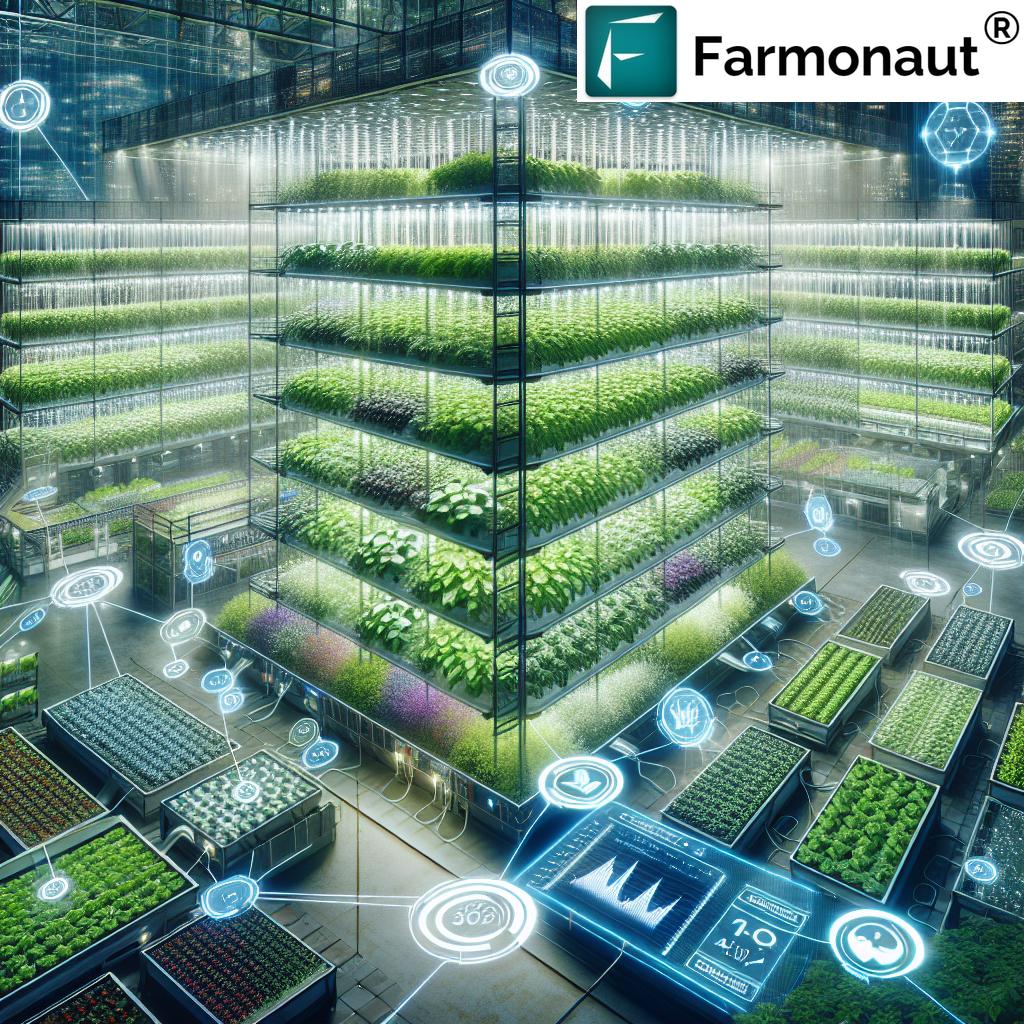
The Power of Data in Agriculture
The true power of IoT and drone technology in agriculture lies in the data they generate. By collecting and analyzing vast amounts of information, farmers can gain unprecedented insights into their operations and make data-driven decisions.
Key benefits of agricultural data analytics include:
- Predictive Modeling: Anticipating crop yields, pest outbreaks, and weather patterns.
- Resource Optimization: Identifying areas where water, fertilizer, or other inputs can be used more efficiently.
- Risk Management: Assessing and mitigating potential threats to crop health and yield.
- Sustainability Tracking: Monitoring environmental impact and compliance with sustainability goals.
At Farmonaut, we’ve developed advanced algorithms that process satellite imagery and other data sources to provide actionable insights for farmers. Our platform allows users to track crop health, detect anomalies, and make informed decisions about their farming practices.
“Farmonaut’s platform provides insights on crop detection, health, and yield prediction using advanced agritech innovations.”
Smart Farming Solutions for a Sustainable Future
As we face the challenges of climate change and increasing food demand, smart farming solutions are becoming essential for sustainable agriculture practices. These technologies not only improve crop yields but also help conserve resources and reduce the environmental impact of farming.
Some key sustainability benefits of precision agriculture include:
- Water Conservation: Precision irrigation systems can reduce water usage by up to 30%.
- Reduced Chemical Use: Targeted application of pesticides and fertilizers minimizes runoff and soil contamination.
- Lower Carbon Footprint: Optimized machinery usage and reduced input waste lead to lower greenhouse gas emissions.
- Biodiversity Protection: Precise pest management techniques help preserve beneficial insects and wildlife.
By adopting these smart farming solutions, we can work towards a more sustainable and food-secure future for generations to come.
Farmonaut: Empowering Farmers with Advanced Technology
At Farmonaut, we’re committed to making precision agriculture accessible and affordable for farmers worldwide. Our platform integrates satellite imagery, AI, and machine learning to provide comprehensive farm management solutions.
Key features of our platform include:
- Satellite-Based Crop Health Monitoring: We use multispectral satellite images to track vegetation health, soil moisture, and other critical metrics.
- AI-Powered Advisory System: Our Jeevn AI delivers personalized farm advice, weather forecasts, and crop management strategies.
- Blockchain-Based Traceability: We offer transparent and secure supply chain tracking for various agricultural products.
- Resource Management Tools: Our platform helps optimize fleet management and resource allocation for improved efficiency.
By leveraging these advanced technologies, we’re helping farmers increase their productivity, reduce costs, and adopt more sustainable practices.
Explore our platform:
The Future of Farming: IoT and Beyond
As we look to the future, the integration of IoT and drone technology in agriculture is set to deepen and expand. Emerging technologies like 5G networks, edge computing, and advanced AI will further enhance the capabilities of smart farming systems.
Some exciting developments on the horizon include:
- Autonomous Farm Machinery: Self-driving tractors and harvesters that can operate 24/7 with minimal human intervention.
- Advanced Crop Genetics: Using AI and big data to develop more resilient and productive crop varieties.
- Vertical Farming Integration: Combining IoT sensors with indoor farming techniques for year-round production in urban areas.
- Blockchain for Food Traceability: Enhancing supply chain transparency from farm to table.
These advancements will continue to drive efficiency, sustainability, and food security for our growing global population.
Overcoming Challenges in Precision Agriculture
While the benefits of IoT and drone technology in agriculture are clear, there are still challenges to overcome for widespread adoption. Some of these challenges include:
- Initial Investment Costs: The upfront expenses for IoT devices and drones can be significant for small-scale farmers.
- Technical Expertise: Farmers may need training to effectively use and maintain these advanced technologies.
- Data Privacy and Security: Protecting sensitive farm data from cyber threats is an ongoing concern.
- Connectivity Issues: Rural areas may lack the necessary internet infrastructure for IoT devices to function optimally.
At Farmonaut, we’re working to address these challenges by offering affordable solutions, providing user-friendly interfaces, and ensuring robust data protection measures.
Precision Farming Technologies and Their Impact
| Technology | Application in Agriculture | Benefits | Estimated Yield Increase |
|---|---|---|---|
| Agricultural Drones | Field mapping, crop monitoring, precision spraying | Improved crop health, reduced chemical use, early problem detection | 10-15% |
| IoT Sensors | Soil and weather monitoring, crop health tracking | Optimized resource use, real-time data collection | 15-20% |
| GPS-Guided Machinery | Precise planting, fertilizing, and harvesting | Reduced overlap, improved efficiency, lower fuel consumption | 5-10% |
| Cloud-Based Farm Management Systems | Data analysis, decision support, record keeping | Improved farm planning, data-driven decisions | 10-25% |
This table illustrates the significant impact that various precision farming technologies can have on agricultural productivity. By adopting these smart farming solutions, farmers can potentially increase their crop yields by 15-30% or more, depending on the specific technologies implemented and local conditions.
The Role of Artificial Intelligence in Agriculture
Artificial Intelligence (AI) is playing an increasingly important role in precision agriculture, enhancing the capabilities of IoT devices and drones. AI algorithms can process vast amounts of data collected from various sources to provide actionable insights and automate decision-making processes.
Key applications of AI in agriculture include:
- Crop and Soil Monitoring: AI-powered image analysis can detect early signs of crop stress, disease, or nutrient deficiencies.
- Predictive Analytics: Machine learning models can forecast crop yields, pest outbreaks, and optimal harvest times.
- Automated Irrigation: AI systems can optimize water usage by analyzing soil moisture data and weather forecasts.
- Robotic Harvesting: AI-guided robots can identify ripe produce and harvest it with precision.
At Farmonaut, our AI-driven Jeevn advisory system combines satellite data with machine learning algorithms to provide personalized recommendations for crop management, helping farmers make informed decisions throughout the growing season.
Empowering Smallholder Farmers with Technology
While large-scale agricultural operations have been quick to adopt precision farming techniques, it’s crucial to ensure that smallholder farmers also benefit from these technological advancements. Smallholder farmers play a vital role in global food security, especially in developing countries.
Initiatives to make precision agriculture accessible to smallholders include:
- Affordable IoT Solutions: Developing low-cost sensors and devices tailored for small-scale farming.
- Mobile Apps: Creating user-friendly applications that provide farming advice and market information.
- Community-Based Drone Services: Offering shared drone mapping and spraying services for groups of small farms.
- Training Programs: Providing education on how to effectively use and benefit from agricultural technologies.
By democratizing access to these technologies, we can help smallholder farmers increase their productivity, improve their livelihoods, and contribute to global food security.
The Environmental Impact of Precision Agriculture
As we face the challenges of climate change and environmental degradation, precision agriculture offers a path towards more sustainable farming practices. By optimizing resource use and reducing waste, these technologies can help mitigate the environmental impact of agriculture.
Key environmental benefits include:
- Reduced Water Usage: Precision irrigation systems can significantly decrease water consumption in agriculture.
- Lower Chemical Inputs: Targeted application of fertilizers and pesticides minimizes runoff and soil contamination.
- Soil Conservation: Improved management practices help maintain soil health and reduce erosion.
- Decreased Carbon Footprint: Optimized machinery use and reduced inputs lead to lower greenhouse gas emissions.
At Farmonaut, we’re committed to promoting sustainable agriculture through our technology solutions. Our platform helps farmers monitor their environmental impact and make decisions that balance productivity with ecological responsibility.
The Future of Food Security
As the global population continues to grow, ensuring food security for all becomes increasingly challenging. Precision agriculture, powered by IoT and drone technology, offers a promising solution to this pressing issue.
By increasing crop yields, reducing waste, and optimizing resource use, these technologies can help us meet the rising demand for food while minimizing the environmental impact of agriculture. Moreover, the data-driven insights provided by precision farming techniques can help policymakers and agricultural organizations make informed decisions about food production and distribution on a global scale.
At Farmonaut, we’re proud to be part of this agricultural revolution, providing farmers with the tools they need to contribute to a more food-secure future.
Conclusion: Embracing the Agricultural Revolution
The integration of IoT devices and drones in agriculture represents a significant leap forward in our ability to produce food sustainably and efficiently. As we’ve explored in this article, these technologies offer numerous benefits, from optimizing resource use to increasing crop yields and reducing environmental impact.
At Farmonaut, we’re committed to driving this agricultural revolution forward. Our platform combines satellite imagery, AI, and data analytics to provide farmers with the insights they need to make informed decisions and improve their operations. By making these advanced technologies accessible and affordable, we’re helping to create a more sustainable and food-secure future for all.
As we look ahead, the continued development and adoption of smart farming solutions will play a crucial role in addressing the global challenges of food security and environmental sustainability. By embracing these innovations, we can work towards a future where agriculture is not only more productive but also more in harmony with our planet’s ecosystems.
To learn more about how Farmonaut can help you leverage the power of precision agriculture, explore our platform and services:
Discover Farmonaut:
For developers interested in integrating our technology into their own solutions, check out our API and API Developer Docs.
Frequently Asked Questions (FAQ)
- What is precision agriculture?
Precision agriculture is a farming management concept that uses technology to observe, measure, and respond to variability in crops. It aims to optimize returns on inputs while preserving resources. - How do IoT devices benefit farmers?
IoT devices in agriculture provide real-time data on soil conditions, weather, and crop health, allowing farmers to make informed decisions about irrigation, fertilization, and pest control. - What types of drones are used in agriculture?
Agricultural drones typically include multirotor and fixed-wing drones equipped with various sensors and cameras for mapping, monitoring, and spraying applications. - How does Farmonaut’s platform work?
Farmonaut’s platform uses satellite imagery and AI to provide insights on crop health, detection, and yield prediction. It offers real-time monitoring and personalized recommendations for farm management. - Can small-scale farmers benefit from precision agriculture?
Yes, there are increasingly affordable solutions and shared services that make precision agriculture accessible to small-scale farmers, helping them improve productivity and reduce costs. - How does precision agriculture contribute to sustainability?
Precision agriculture promotes sustainability by optimizing resource use, reducing chemical inputs, and minimizing environmental impact through targeted farming practices. - What are the challenges in adopting precision farming technologies?
Challenges include initial investment costs, technical expertise requirements, data privacy concerns, and connectivity issues in rural areas. - How does AI enhance precision agriculture?
AI in agriculture processes large amounts of data to provide actionable insights, automate decision-making, and enhance the capabilities of IoT devices and drones. - What is the future of precision agriculture?
The future of precision agriculture includes advancements in autonomous machinery, advanced crop genetics, vertical farming integration, and blockchain for food traceability. - How can I get started with Farmonaut’s precision agriculture solutions?
You can explore Farmonaut’s solutions by visiting our website, downloading our mobile app, or contacting our team for a personalized consultation on how our technology can benefit your farming operations.





